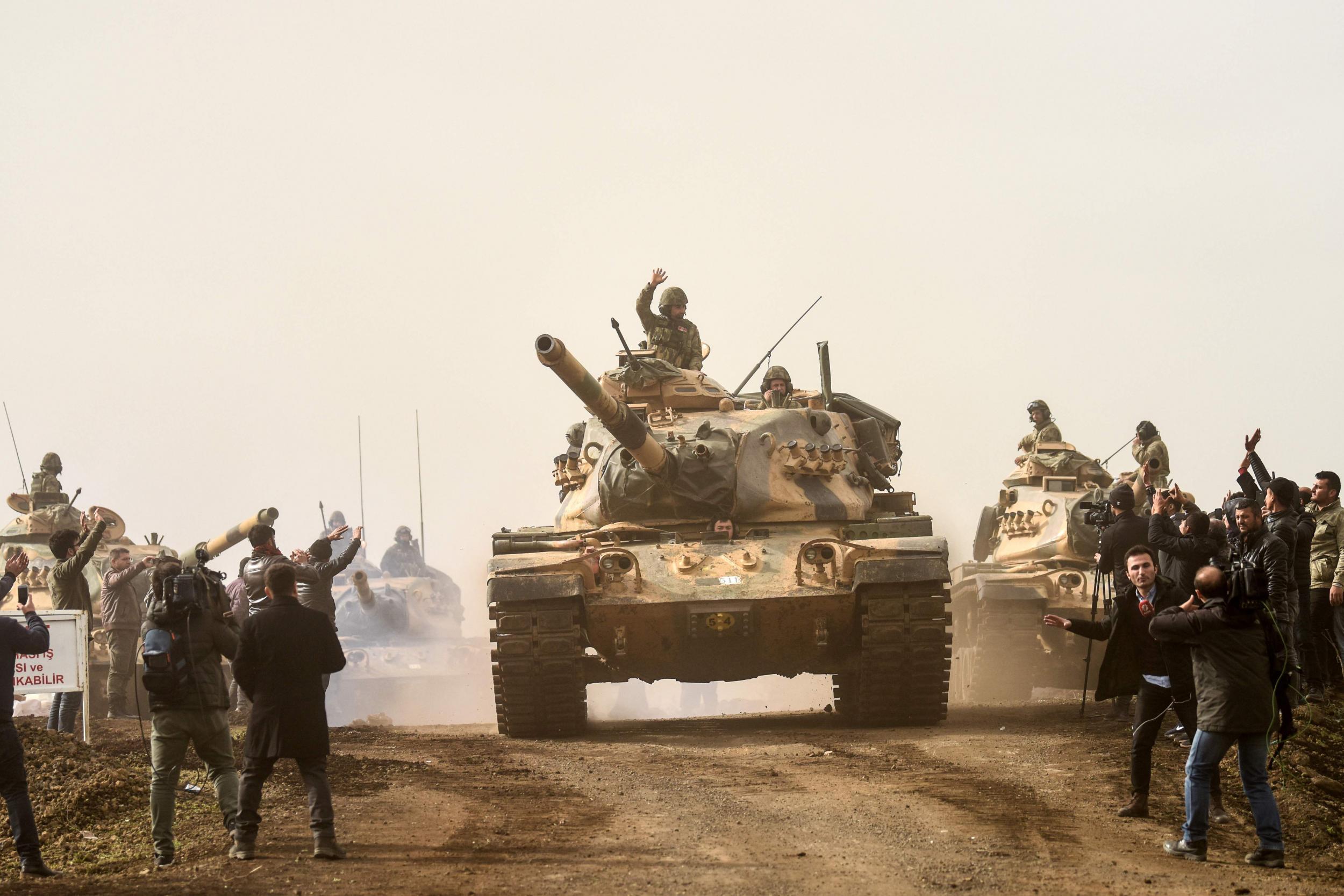By moving into Syria, Turkey is risking its own national security
The Turkish authorities should long ago have realised that the Kurdish issue can only be solved in the longer term through some form of political settlement

The two Turkish troops who reportedly lost their lives in the military incursion into Syrian territory are unlikely to be the last casualties in this latest twist in the merciless war in the region. The Turkish foreign minister, Mevlut Cavusoglu, tweeted in response to the news: “We will not leave the blood of our martyrs on the ground and will continue our struggle until we root out terror.”
If the recent history of Syria and Iraq is any guide, that “struggle” will continue over many decades.
Not so long ago, many Turks feared that Isis forces lapping up against their southern border with Syria would trigger some sort of internal conflict in their own country, and that their own (substantial) armed forces would not be able to defend them fully against Isis’s notoriously barbarous and reckless terror.
Now, it seems, Ankara is so confident of its own strength, and that of its de facto Russian and Iranian allies, that it is emboldened to invade Syria instead. The ostensible aim is to eliminate terrorist elements holding out in an enclave of Afrin, the Kurdish YPG forces who sought to free themselves from Isis’s control. Of course, they are also anxious to help build the long-awaited Kurdish homeland across the territories of Iraq, Iran, Syria and Turkey. For decades, indeed more or less since the establishment of modern Turkey around a century ago, the spectre of an independent Kurdistan carved out of eastern Turkish territory has haunted successive governments. Now President Erdogan could see his chance to flatten the Kurdish national cause for good, under the cover of the Syrian civil war and the war on Isis.
On its own terms that might be a logical nationalist policy to follow, if an inhumane and undemocratic one. Yet even on its own narrow terms it is fatally flawed.
In the first place, Turkey is foolishly risking its longstanding security treaty with the United States via Nato. This has served Turkey well, protected its independence and, most all, enabled it to resist Russian encroachment and bullying. President Vladimir Putin, in Ukraine, Georgia and elsewhere, has shown us just what a territorially ambitious leader he is, and how he now sees a clear opportunity to become a superpower once again from the Caucasus to the Black Sea, the Bosphorus through to the Mediterranean. It is a dream that the Tsars and the Soviets never managed to realise. It seems tantalisingly close now and all because Mr Erdogan finds himself in this deadly embrace with President Putin.
Mr Putin may be more than happy to help Mr Erdogan to crush the Kurds – but he will want something in return in due course.
The second risk Turkey runs is to further the longer-term goals of Isis. It is true that Isis is virtually finished on the ground as a geographical “caliphate”, but as an ideology it will continue and it thrives on the kind of repression that the Turks and Russians – and their puppet President Assad – specialise in. No village that has been gassed with chemical weapons or been razed by aerial bombing will welcome Turkish forces as friends and liberators.
By the same token, the Turkish authorities should long ago have realised that the Kurdish issue can only be solved in the longer term through some form of political settlement. Long before Isis or America’s wars against Saddam Hussein, Turkey was fighting Kurdish terrorists on its own soil, an intermittent war of attrition that seemed to have no end but which was conducted with a comparatively low level of violence.
Turkey’s invasion of Syria will most certainly escalate that level of violence against Turkish civilians at home and against Turkish forces at home and abroad.
The delusion reigning in Ankara is that the Kurdish question can be ended by using violence and in concert with any unsavoury partners and at any cost to its long-term relations with Nato and America. To call it a gamble on President Erdogan’s part is to dignify it with some sort of rational calculation. It is, in fact, a thoroughly dangerous act of arrogance verging on mindlessness.
Turkey’s future as a stable secular democracy has been in jeopardy in recent years. Not so long ago, though, the security situation had seemed to stabilise with the retreat of Isis. This invasion threatens all of that again. The Turkish people, as much as the Kurds, will come to regret this aggression.

Join our commenting forum
Join thought-provoking conversations, follow other Independent readers and see their replies